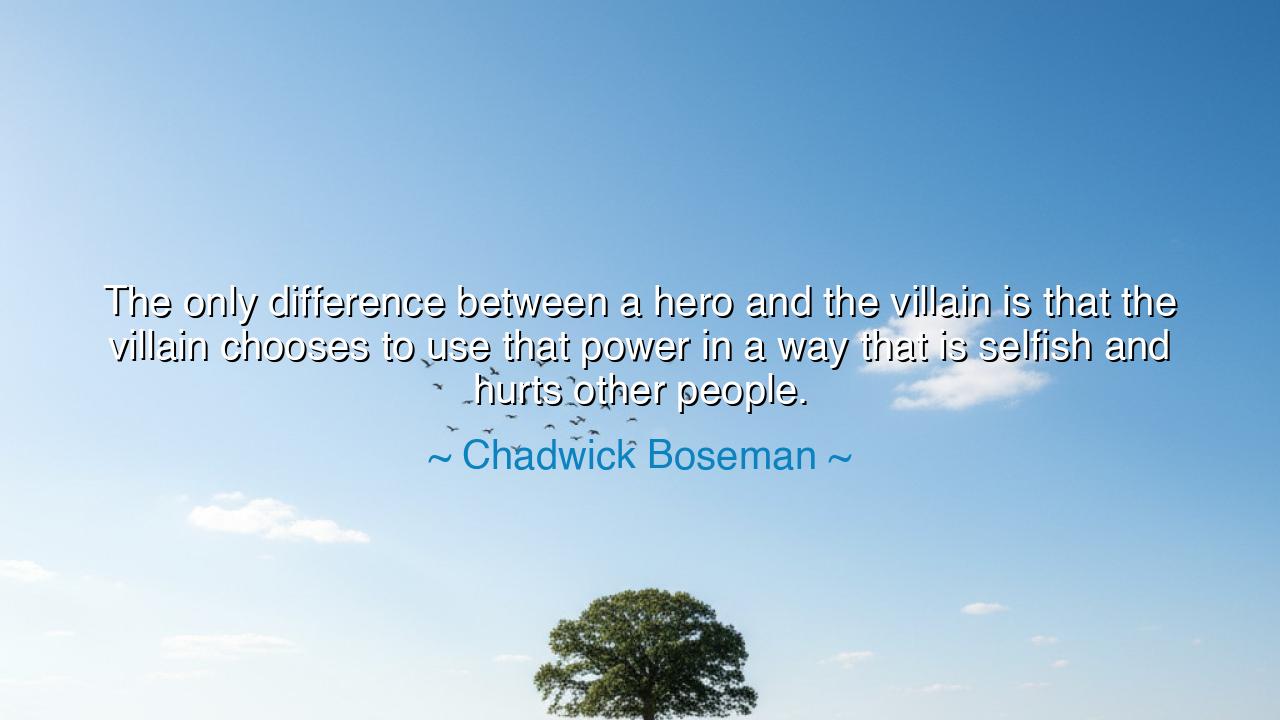
The only difference between a hero and the villain is that the
The only difference between a hero and the villain is that the villain chooses to use that power in a way that is selfish and hurts other people.






Chadwick Boseman, whose life itself became a beacon of courage and dignity, once declared: “The only difference between a hero and the villain is that the villain chooses to use that power in a way that is selfish and hurts other people.” In these words, he unveils the eternal struggle between light and darkness within the human soul. For both hero and villain possess power, yet what divides them is not the gift itself, but the choice of how it is wielded.
The villain turns inward, binding his strength to selfish desire, seeking dominion, pleasure, or vengeance at the cost of others. His victories are soaked in suffering, and his throne rests upon the broken. The hero, by contrast, turns outward. He uses his power to shield, to serve, to lift others higher than himself. Thus, the dividing line between villainy and heroism is drawn not by destiny nor by birth, but by choice—a choice renewed each day by every soul who holds even a fragment of influence.
History proves this truth. Napoleon Bonaparte, gifted with genius and strength, rose first as a liberator, admired for bringing order to chaos. But when his ambition turned inward, when his power became self-serving, he crossed the line into villainy, leaving Europe drenched in blood. By contrast, George Washington, also armed with military might, chose to step away from kingship and return to the plow. In choosing humility and service over selfish gain, he revealed the heart of a hero.
Boseman’s words echo also in his own art, most famously in the story of Black Panther, where T’Challa and Killmonger, though sharing the same royal blood and strength, were divided by choice. One sought vengeance and domination; the other sought peace and protection. The tale, though clothed in fiction, reflects a truth as old as mankind: that power itself is neutral, but its use defines the soul who holds it.
O children of tomorrow, let this teaching take root in your hearts. You too bear power—perhaps not in armies or crowns, but in your words, your hands, your influence upon those around you. Each choice you make declares whether you walk the path of hero or of villain. Choose selflessness, choose compassion, and let your strength be a shelter, not a weapon. For in the end, the greatest difference between darkness and light is not in what we possess, but in what we choose to give.






TPNguyen Thi Phuong
I wonder how much of being a hero or villain is determined by external judgment versus internal morality. Could someone believe they are acting heroically while others see them as selfish or harmful? This quote makes me question the subjectivity of moral labels and whether society oversimplifies complex human behavior. How might we create a system that encourages responsible use of power while acknowledging the gray areas of human choice?
DATran Nguyen Duc Anh
This perspective also makes me question whether true heroes exist, or if heroism is just a matter of consistently making better choices than others. If anyone could become a villain under certain circumstances, does that mean heroism is more about commitment to ethics than innate virtue? I’m interested in exploring how this idea could influence leadership development and moral education in schools and professional settings.
TTTrinh Thanh Tuyen
I feel a little uneasy thinking about how easily someone could cross the line from hero to villain. It makes me wonder how much self-awareness and discipline are necessary to maintain ethical behavior when wielding power. Could regular reflection or guidance prevent someone from succumbing to selfish impulses? And does society provide enough support to ensure that those with influence make choices that benefit others rather than themselves?
PNphuong Nguyen
I can’t help but reflect on modern media and how often characters are portrayed in black-and-white terms. Could this perspective encourage more nuanced storytelling, where heroes and villains are differentiated by choice rather than inherent traits? It also raises questions about accountability: if someone makes a selfish decision under duress, are they still morally the same as someone who deliberately harms others for personal gain?
DTpham duc trong
It’s fascinating to consider how close heroes and villains might actually be in potential, separated only by their decisions. Does this imply that anyone with the ability to impact others has a responsibility to use their power ethically? I’m also curious whether external pressures, like societal expectations or personal trauma, can push someone toward selfish actions, and whether understanding those pressures changes how we define villainy.